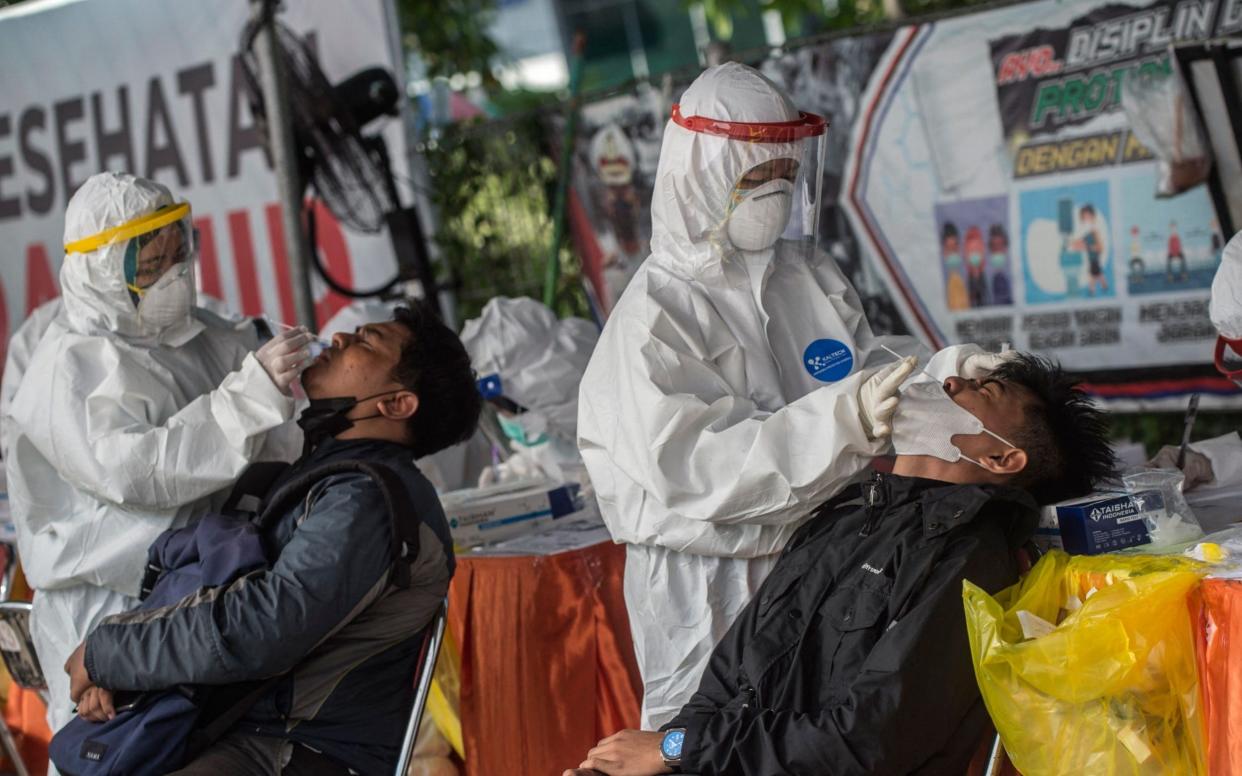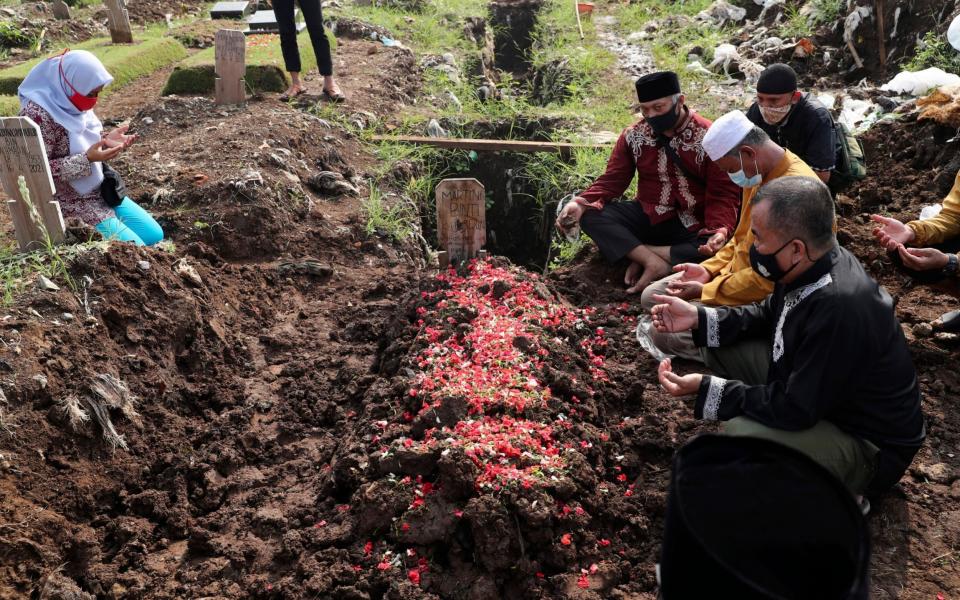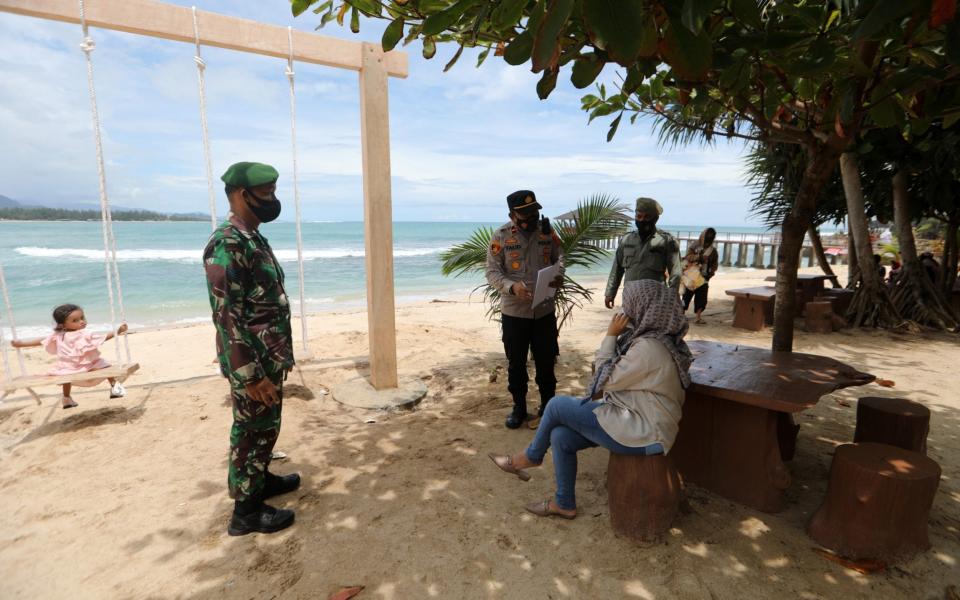Indonesia fears coronavirus ‘time bomb’ as a post-Eid spike gains momentum

All Rujiman had wanted to do was to treat his mother to a longed-for visit to their home village in central Java for the first time in two years. Now she lies seriously ill in hospital, suffering from Covid-19, a disease he did not previously believe existed.
Like millions of Indonesians, Rujiman, 28, and his mother navigated their way through weak virus prevention measures to return home last month to join family and friends for the Eid al-Fitr holiday after the Muslim holy month of Ramadan.
Health experts have warned the jump in travel, mass gatherings and spread of new Covid-19 variants in the world’s fourth most populous country may now have created a coronavirus “time bomb.”
With close to 1.9 million confirmed cases and some 52,000 deaths since the pandemic began, Indonesia has been the worst-hit country in Southeast Asia. It has not experienced the devastating crisis seen in India, but there is rising concern that such a scenario is possible.
Recent infection numbers suggest a post-Eid spike has begun.

On Wednesday, Indonesia reported 7,725 new coronavirus infections, the highest daily number since February 26, and 170 deaths.
Rujiman and his mother were diagnosed in a pop-up testing booth at a bus station after they returned to the capital, Jakarta, by public transport.
His mother’s symptoms were already so bad that she was immediately transferred to hospital, and Rujiman now has a fever and sore throat preventing him from returning to his job as a roofer. He is surviving on food donations from neighbours.
Before the trip, he had heard of Covid-19 from the television news and TikTok, but his colleagues insisted the disease was “made-up.”
Last year, they had lost their jobs because of pandemic restrictions and had been forced to live on government handouts that did not even cover the rent. This year, work had picked up and he promised his mother an overdue trip home to see family.

On the way, they avoided checkpoints enforcing a nationwide travel ban by hiring a small van and travelling by night along back roads, carrying only small bags so as not to appear suspicious. They were stopped once by the police but said they were visiting someone in hospital and allowed to carry on.
When they arrived in their village, time was tight and they did not quarantine. “I assured them that we were healthy. They are all friends after all,” he said. But before they returned to Jakarta, his mother already had a fever.
“I am disappointed in myself. I hope I am not too late and my mother didn’t transmit the disease to anyone else. I hope she will get better again so we can live like before,” he said.
Indonesia’s current surge in recorded infections is apparent despite the country’s poor record on testing and contact tracing.
The results of two major seroprevalence studies, which test for antibodies, and were released to Reuters last week, revealed that Covid-19 is many times more prevalent in Indonesia than shown by official figures.

One nationwide study between December and January suggested 15 per cent of Indonesians had already contracted Covid-19 – when official figures at the end of January had recorded infections among only around 0.4 per cent of people.
Preliminary results of a separate seroprevalence study in Bali, done by the University of Udayana, found 17 per cent of those tested in September and November appeared to have been infected – 53 times higher than the corresponding official rate of infection.
The tourist island is planning to reopen to international visitors next month.
The islands of Java and Madura have emerged as new coronavirus hotspots since May, forcing the authorities to draft in more medics.
In the district of Kudus in Java and Bangkalan in the neighbouring island of Madura, hospital capacity has reportedly hit at least 90 per cent, and hundreds of healthcare workers have been infected.
The spike in Kudus has prompted the government to conduct genome sequencing tests on samples from patients, alarmed that it may have been fuelled by more transmissible variants.
Pandu Riono, a University of Indonesia epidemiologist, said the current crisis was “more dangerous” because of the mutating characteristics of the virus.
He said scientists were rushing to analyse the Kudus samples to determine if the infections stemmed from the original virus, an Indonesian mutation, known variants of concern, or were a mixture of some or all.

The Alpha, Beta and Delta variants, originating from the UK, South Africa and India have already been detected in Indonesia.
“The dangerous part of the current situation is the new mutations have become faster than before. We are racing between the new mutations and protecting vulnerable people,” said Dr Riono.
The only real solution was to speed up the vaccination programme, he added.
Just 6 per cent of Indonesia's targeted population of 181 million have been fully vaccinated with two doses so far, while 9.4 per cent have had one shot, according to government data at the start of June.
Joko Widodo, the president, tweeted on Wednesday that the nation’s vaccination rate must increase to 700,000 doses a day this month, going up to 1 million daily by July.
Southeast Asia’s largest economy is relying on China's Sinovac for the first tens of millions of vaccine shots but also plans to use AstraZeneca later in its rollout. It has asked Beijing for technical assistance to set Indonesia up as a regional vaccine production hub.
In the meantime, regional leaders are trying to fight back the virus through localised lockdowns and by reinforcing the country’s struggling healthcare system.
Ganjar Pranowo, governor of Central Java, told the Telegraph infections had rocketed because people had ignored health protocols and “forgotten that this pandemic is still a serious threat to society” during the “homecoming wave.”
He said there was a suspicion that a variant could have seeped into Java through the port city of Cilacap, carried by foreign sailors.
“We have taken precautions. The steps to reduce Covid-19 in Kudus are quite significant,” he said. “When Covid-19 in Kudus exploded only in a matter of days, the local government immediately closed all activities and locations that might cause crowds.”
The governor insisted that the situation was under control. “We have to always be optimistic that we can beat this crisis,” he said.
Protect yourself and your family by learning more about Global Health Security

